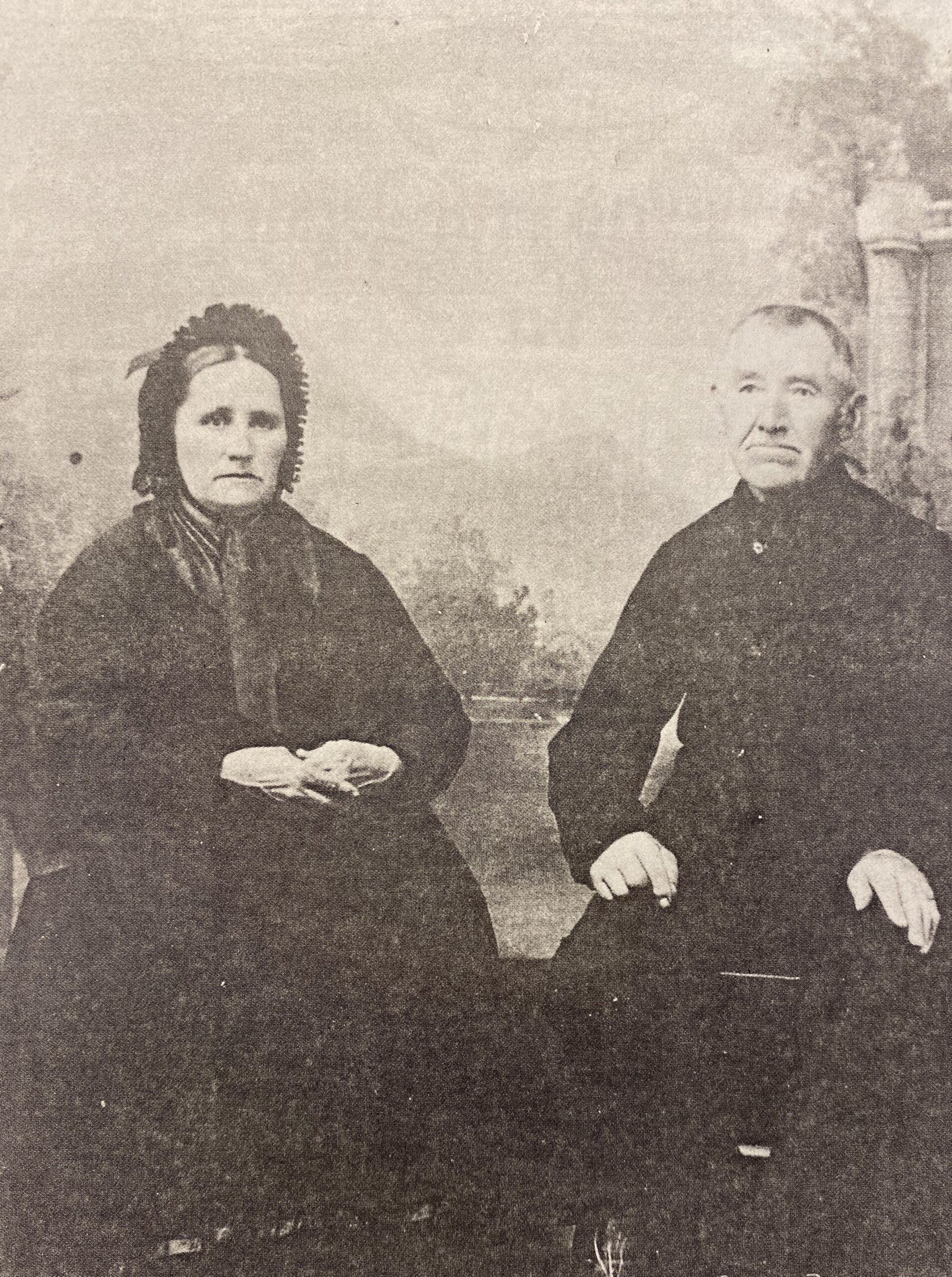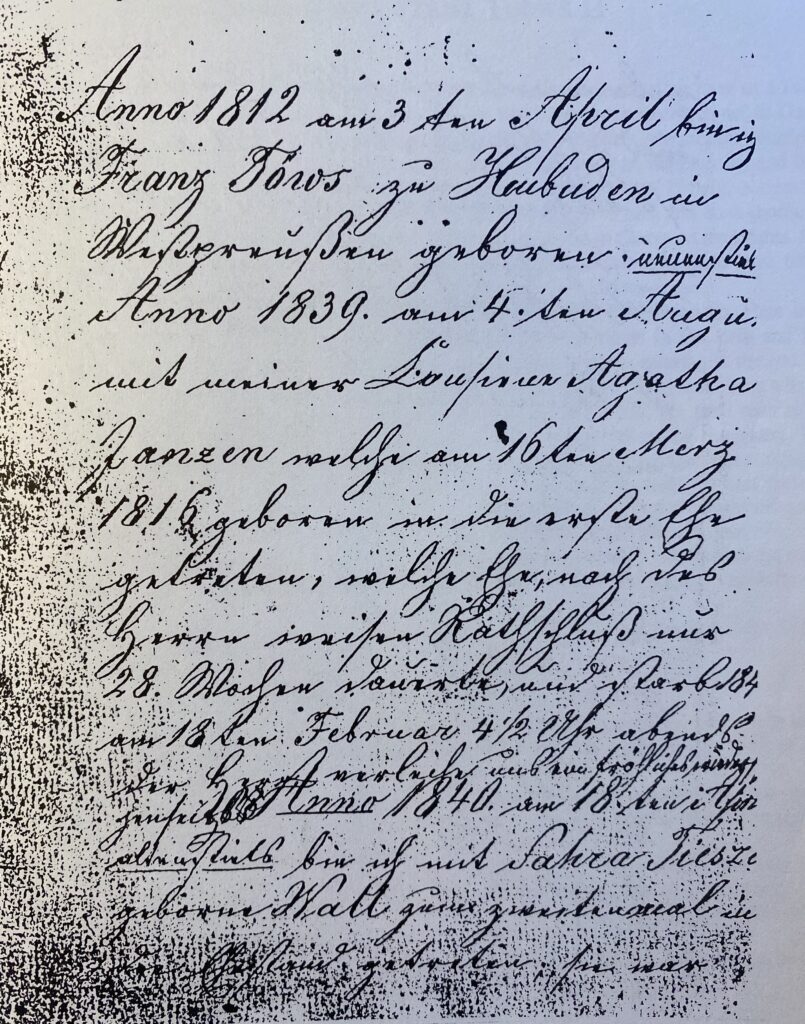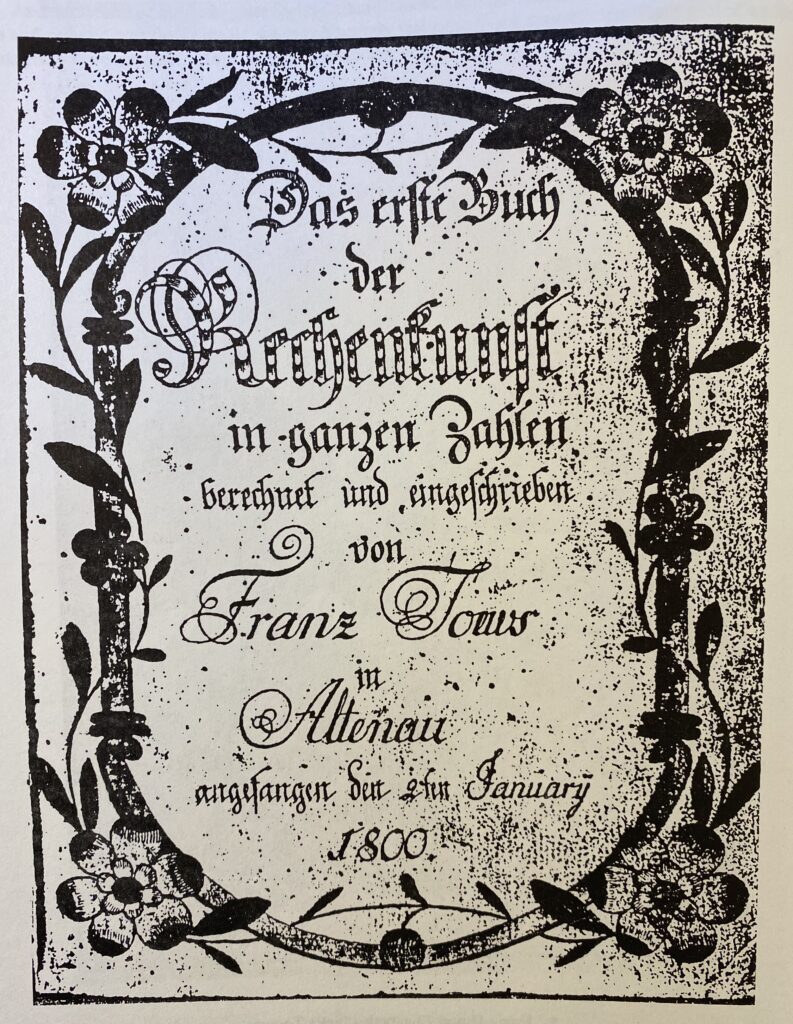We know much about our ancestor Franz Toews, who was born April 3, 1812, in Heubuden, West Prussia (now part of Poland). We know he was married four times and widowed three times. We know that he fathered twelve children in the last two of his marriages. We know the names, birth dates and death dates of those wives and children.

We know many of these details about this ancestor because he made them known. Writing in the previously blank pages in the back of a math book authored by another Franz Toews and published in 1800, Franz (we’ll call him Franz 1812 to distinguish him from others) gave us a detailed record of his birth date, his marriages and his children.

From other resources, we know Franz 1812 moved to the Molotschna colony in Russia (Ukraine) for a few decades. Then he migrated with his family to the United States in 1875.
Recently I have been able to uncover a few more details about Franz 1812 which I find interesting. For example, I learned that Franz 1812 made his move to the Molotschna colony in the late 1830s (1837, according to Adalbert Goertz in Migration of Mennonites from West Prussia to Russia 1820-1841; or 1838, according to the 1835 census for the Molotschna Mennonite colony).
It is no surprise that Franz 1812 was a conscientious citizen and farmer who took care of his property. When in 1843 the Russians made a list of property owners in the Molotschna colony and classified the proprietors as good, average or negligent, Franz 1812 was listed among the good proprietors in the village of Pordenau.
We also know that Franz 1812 carried out his duties as a citizen, for his name is on the list as one of the proprietors who voted in 1847. In fact, if a person wanted to do more extensive research, it is possible to find out the candidates for whom he voted!
The most intriguing detail about Franz 1812 to me is that he was an ordained minister (Lehrer) in the Mennonite congregation of Pordenau. He was ordained in 1849. Franz 1812, Aron Penner and Peter Dyck served together in that capacity under Elder/Bishop (Altester) Heinrich Toews, assisted by Gerhard Wall as a deacon. We have a history of church ministry going back at least nearly 200 years!
There are details about Franz 1812 which we are not told. For example, he did not write down his parents’ names when he penned his biographical information. It is assumed his father’s name was Franz Toews, since that is the name of the author of the math book in which Franz 1812 wrote about himself. However, nowhere do we have a statement from him giving the name of his mother or identifying either of his parents.
Furthermore, the assumption that the math book was written by Franz 1812’s father has been bothering me for some time. Think about this with me for a moment. The book was published in 1800 by a Franz Toews in Altenau. This much we know for sure, since that information is imprinted in the book.

It is believed that Franz 1812 was the only child of his parents. So let’s say his father was probably somewhere between 20-35 years old when Franz 1812 was born on April 3, 1812. That would mean his father was born sometime between 1777 and 1792. This would mean his father was somewhere between the ages of 8 and 23 years of age when he published that math book. Not. Likely.
Of course, it is possible that Franz 1812’s father was much older when he married and/or fathered Franz. However, the likelihood of that is quite low. The average age of men in that Toews family line at the time of fathering their first child is about 25 years.
Much more likely is the assumption that it was Franz 1812’s grandfather who authored that math book, someone who had more experience, more resources and more credibility with his readers than a person under 25 would possess. This would be especially true in the Mennonite society of that day, where the elderly were respected and honored for their wisdom far more than in our current culture, while young adults were viewed as being in the process of gaining wisdom.
So, with that assumption in mind, I have been researching records to see if I could find a Franz Toews about whom records would suggest he is the grandfather of Franz 1812 rather than his father. This investigation has opened up some interesting results and theories, which I plan to share with you in the future—after I do more research with the goal of firming up some of the theories which have come to mind.
I will mention this as a teaser: there is a Frantz Toews listed as a land owner in Altenau, West Prussia, in the 1789 land census of West Prussian Mennonites. There is also an Abraham Toews listed as a land owner in Heubuden, West Prussia, in that same census. Those villages are definitely where our Toews ancestors lived at one time, so this information is certainly pertinent.